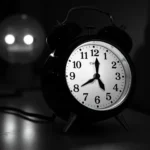If You Can’t See Your Face in a Dream: What it Might Mean

Introduction
Have you ever woken up from a dream feeling unsettled because you couldn’t see your own face? If you can’t see your face in a dream, it can be a curious and sometimes unsettling experience. But don’t worry – this is a common occurrence, and it often holds important symbolic meaning.
In this article, we’ll explore the possible interpretations and significance of not seeing your face in a dream. If you can’t see your face in a dream, it might mean something about your sense of identity, your subconscious thoughts, or even your spiritual and emotional well-being. Understanding the potential meanings can provide valuable insight into your inner world and the messages your dreams are trying to convey.
What Does it Mean if You Can’t See Your Face in a Dream?
There are several potential interpretations for not seeing your face in a dream. Here are some of the most common meanings:
1. Lack of Self-Awareness
One of the most common interpretations of not seeing your face in a dream is a lack of self-awareness. When you can’t see your own face, it can suggest that you’re feeling disconnected from your true self or unsure of your identity. This could be a sign that you need to spend more time getting to know yourself, exploring your thoughts, feelings, and values on a deeper level.
2. Avoidance of Introspection
Similarly, not seeing your face in a dream can indicate that you’re avoiding introspection or inner exploration. If you’re uncomfortable looking inward, your subconscious may be preventing you from seeing your own reflection in your dreams. This could be a sign that you need to work on being more self-aware and open to understanding your own thoughts and emotions.
3. Feelings of Insecurity or Uncertainty
When you can’t see your face in a dream, it can also suggest feelings of insecurity or uncertainty about yourself. This could be related to your physical appearance, your sense of identity, or even your place in the world. If you can’t see your face in a dream, it might mean that you’re struggling with self-doubt or a lack of confidence.
4. Dissociation or Depersonalization
In some cases, not seeing your face in a dream can be a sign of dissociation or depersonalization. These are psychological experiences where you feel disconnected from your own thoughts, feelings, or physical body. If you frequently experience this in your dreams, it’s worth considering whether you’re dealing with any underlying mental health issues that may require professional support.
5. Spiritual or Symbolic Meaning
Finally, not seeing your face in a dream can also have a more spiritual or symbolic meaning. In some belief systems, the face is seen as a representation of the soul or the essence of a person. When you can’t see your own face, it might suggest that you’re exploring deeper aspects of your spiritual or unconscious self.
Factors That Can Influence the Meaning
It’s important to note that the interpretation of not seeing your face in a dream can depend on a variety of factors, including the overall context of the dream, your personal experiences and beliefs, and your current life circumstances.
For example, if the dream also includes feelings of anxiety, confusion, or a sense of being lost, it might suggest a more negative interpretation, such as a lack of self-awareness or feelings of insecurity. On the other hand, if the dream has a more positive or peaceful tone, it could indicate a more spiritual or transformative experience.
Additionally, your personal beliefs and cultural background can also shape the meaning of not seeing your face in a dream. In some traditions, the face is seen as a reflection of the soul, while in others, it might be more closely tied to issues of identity and self-perception.
Exploring Your Dreams and Finding Meaning
If you’ve experienced not seeing your face in a dream, it can be helpful to take some time to reflect on the dream and explore its potential meanings. Here are some tips to help you get started:
-
Write down the details: As soon as you wake up, try to remember as many details about the dream as possible, including the setting, the emotions you felt, and any other significant elements.
-
Analyze the context: Consider the overall context of the dream and how it might relate to your waking life. What was happening in the dream, and how did you feel about it?
-
Reflect on your feelings: Pay attention to the emotions you experienced in the dream, as these can provide valuable clues about the dream’s meaning. Were you feeling anxious, confused, or curious?
-
Explore your associations: Think about what your face represents to you and how it relates to your sense of identity. What do you associate with your face, and how might those associations be reflected in the dream?
-
Seek guidance: If you’re still struggling to make sense of the dream, consider talking to a trusted friend, a dream interpretation expert, or a mental health professional who can help you explore the deeper meanings and implications.
Remember, dream interpretation is a highly personal and subjective process, and there’s no one-size-fits-all interpretation for not seeing your face in a dream. By approaching it with an open and curious mindset, you can gain valuable insights into your inner world and the messages your subconscious is trying to convey.
Conclusion
If you can’t see your face in a dream, it can be a curious and sometimes unsettling experience. However, this common occurrence often holds important symbolic meaning that can provide valuable insight into your inner world and the messages your dreams are trying to convey.
Whether the dream suggests a lack of self-awareness, avoidance of introspection, feelings of insecurity, or even a more spiritual or symbolic meaning, understanding the potential interpretations can help you gain a deeper understanding of yourself and the workings of your subconscious mind.
By taking the time to reflect on the details of the dream, analyze the context, and explore your own associations and feelings, you can uncover the hidden messages and unlock the transformative potential of your dreams. So the next time you wake up from a dream where you couldn’t see your own face, approach it with an open and curious mindset, and see what insights it might hold.








